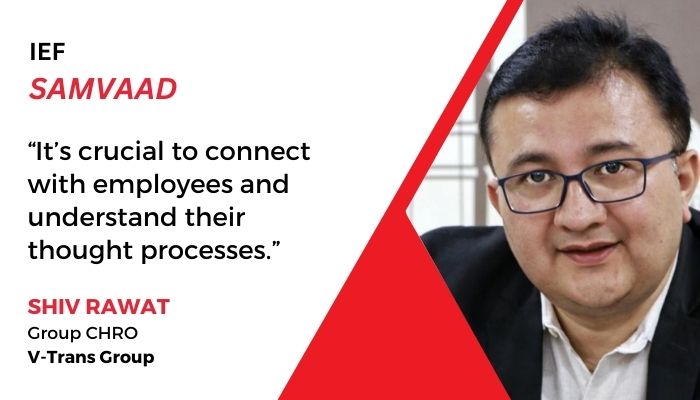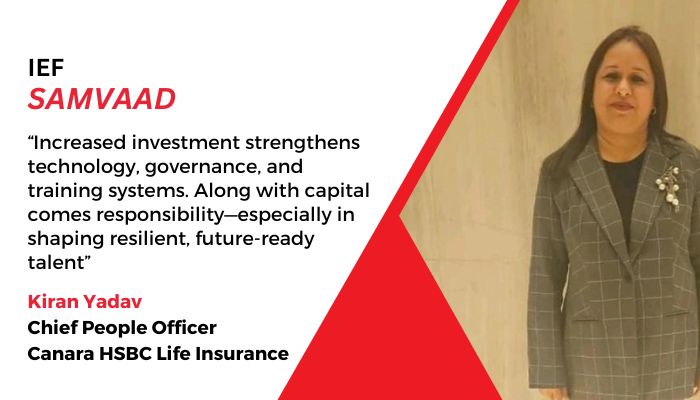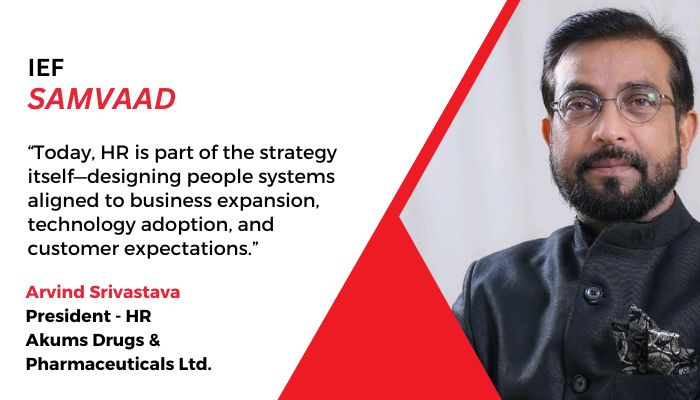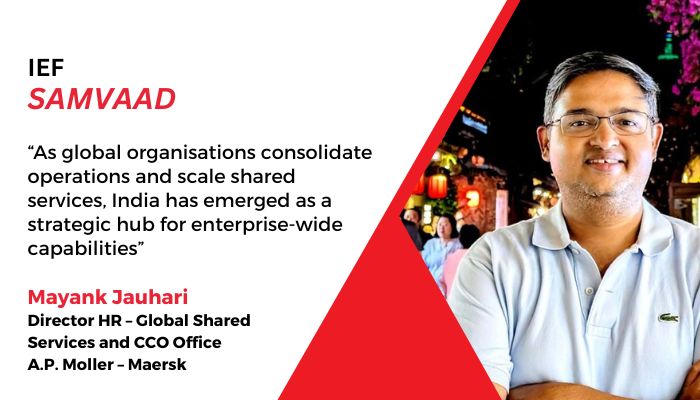Shiv Rawat, Group CHRO, V-Trans Group, speaks to India Employer Forum about today’s evolving work landscape, the role of technology and automation in logistics operations, and more.
Q. You’ve excelled in your professional journey and created valuable YouTube content to help others navigate different aspects of work. What inspired you to start this channel, and how do you think it’s helping professionals in today’s evolving work landscape?
I started my YouTube channel because I am passionate about training and developing people and sharing the knowledge I’ve gained throughout my journey. One of the key things that inspired me is the gap I see in how education and valuable techniques aren’t reaching everyone equally. Often, people at the last mile don’t have access to even simple strategies that could significantly improve their lives and careers. My experience in HR and staying connected with employees has fueled this drive, as I see firsthand how impactful the right guidance can be. Through my channel, I aim to bridge this gap by offering practical advice, sharing life-changing insights, and helping professionals navigate the complexities of today’s work environment. In an era where work dynamics are constantly evolving, I believe my content is empowering people to grow both personally and professionally, making them more adaptable and prepared for the challenges ahead.
Q. What talent management strategies would you recommend to ensure employees are future-ready, particularly with the increasing role of technology and automation in logistics operations?
In today’s rapidly evolving landscape, particularly with technology and automation reshaping logistics operations, it’s essential to rethink talent management strategies. One key challenge is finding the right talent at the right time and cost. Relying on the market or competition often leads to unnecessary fluctuations and pressure. I recommend focusing on building a strong internal talent pipeline. One of the most effective ways to achieve this is by hiring freshers. Give them opportunities, train them in your industry and specific functions, and equip them to handle future challenges. While the process is not without difficulties, such as attrition, maintaining a consistent approach will help you cultivate talent tailored to your organisational needs. By investing in long-term development, you’ll create a future-ready workforce that aligns with your strategic goals and the increasing technological demands in logistics.
Q. Given the rapid digitalisation and e-commerce growth reshaping the logistics industry, retaining skilled talent has become a major challenge. What innovative approaches have you introduced to enhance employee retention and engagement in this evolving landscape?
Retaining skilled talent, especially in a fast-paced and digitally evolving industry like logistics, requires more than just competitive salaries. I have introduced several innovative approaches that focus on engaging employees on a deeper level by addressing their need for growth and connection. Firstly, it’s crucial to connect with employees and understand their thought processes. You can’t retain talent if you don’t know what drives them. Beyond salary, factors such as creating a positive work environment, offering timely recognition, and providing opportunities for individual development are key. Employees need to feel valued and know that their contributions are recognised. Ensure that they have chances to demonstrate their skills and take on challenges that drive their growth. If employees ever feel that their learning and career advancement have stagnated, they are likely to move on. By focusing on continuous development, creating an environment of recognition, and maintaining open communication, you can enhance both retention and engagement, even in an industry reshaped by digitalisation and e-commerce.
Q. The logistics industry has traditionally been male-dominated. What steps can organisations take to promote diversity, equity, and inclusion within their workforce, and how are you ensuring that DE&I becomes an integral part of the company’s culture?
You’re right—many industries, not just logistics, have traditionally been male-dominated, but times are changing, and diversity, equity, and inclusion (DE&I) are gaining much-needed recognition. Companies now understand that fostering DE&I isn’t just a social responsibility but also a strategic advantage. It’s inspiring to see women breaking barriers in logistics, whether as branch managers, in senior leadership roles, frontline workers, or even in hardcore operations, roles that were once unheard of for women in this industry.
To make DE&I an integral part of the company’s culture, organisations should focus on several key areas:
- Recruitment Practices: Actively seek out diverse candidates by partnering with organisations and platforms that cater to underrepresented groups. It’s also important to eliminate biases in the recruitment process to ensure fair opportunities for all.
- Leadership Commitment: DE&I need to be championed from the top. Leaders should openly support and encourage diversity initiatives, setting measurable goals and ensuring accountability.
- Mentorship and Development: Support women and other underrepresented groups through mentorship programs, professional development, and clear pathways for career growth. This helps build confidence and retention.
- Awareness and Training: Conduct regular DE&I training to ensure that employees understand the value of diversity and learn how to contribute to an inclusive work environment.
In my experience, ensuring DE&I becomes part of the company’s culture involves not only setting these practices but also celebrating success stories that inspire others. I still remember hiring a female Regional Operations Manager 25 years ago, which was groundbreaking at the time and sent a clear message that diversity was welcome. That was just the beginning, and today we see women excelling in roles that were once dominated by men, a sign that these efforts are paying off.
Q. In addition to fostering a future-ready workforce and promoting diversity, how do you ensure that leadership within your organisation aligns with these evolving priorities? What leadership development initiatives are in place to cultivate leaders who champion both digital transformation and an inclusive work environment?
To ensure leadership aligns with the evolving priorities of fostering a future-ready workforce and promoting diversity, it’s essential to have strong leadership development initiatives that reflect these goals. In our organisation, we emphasise on the importance of developing leaders who not only drive digital transformation but also champion inclusivity.
Here are some key leadership development initiatives in place:
- Leadership Development Programs: We run targeted leadership programs that focus on the evolving needs of the business, particularly in the areas of digital transformation and inclusivity. These programs provide leaders with the tools to navigate complex technological changes while fostering a diverse and inclusive culture.
- Mentorship and Coaching: Our leadership development includes mentorship, where experienced leaders guide emerging leaders on how to integrate digital strategies and prioritise diversity, equity, and inclusion (DE&I). These relationships help embed the right values and forward-thinking approaches at the leadership level.
- Cross-Functional Exposure: We encourage leaders to gain exposure across different functions and departments, allowing them to better understand the interplay between digital transformation, operations, and workforce diversity. This holistic view strengthens their ability to lead with a balanced approach.
By embedding these leadership initiatives, we ensure that leaders are well-prepared to champion both digital transformation and an inclusive work environment, staying aligned with the company’s evolving priorities.
Q. As Industry 4.0 reshapes logistics, what are your plans for upskilling the existing workforce? How do you balance traditional logistics skills with the need for digital competency in today’s evolving landscape?
As Industry 4.0 transforms logistics, upskilling the workforce becomes a top priority. At our organisation, training is deeply embedded in our culture. We consistently run development programs that not only help employees think bigger and differently but also help them identify areas where they can improve. This focus on personal and professional growth empowers our team to stay ahead in an evolving industry.
In terms of balancing traditional logistics skills with digital competency, we prioritise both. Functional training is a key focus, especially as automation becomes more prevalent in logistics operations. We ensure that employees are equipped with the necessary digital skills, whether it’s handling automated systems, data analytics, or learning to adapt to new technologies. By combining traditional logistics expertise with these modern competencies, we create a workforce that is agile, adaptable, and ready to thrive in the Industry 4.0 era.
About Shiv Rawat, CHRO, V-Trans Group
Shiv Rawat is an accomplished HR professional with over 28 + years of diverse experience in the logistics, supply chain, and e-commerce industries. Currently, serving as the Group CHRO and vice President of HR for V-Trans Group, Shiv has demonstrated transformative leadership throughout his career. Beginning as an Executive Trainee at DTDC Express Ltd., Shiv’s journey within the company exemplifies clear career growth management. Holding a Management Graduate degree in HR and ECP in HRM from XLRI Jamshedpur, he is also a certified SHRM Professional (SHRM-CP).
Under his leadership during his tenure with DTDC, it has earned accolades such as “Best Companies to Work for” by Business Today and “Coolest Workplace.” Shiv’s thought leadership is evident on various social media platforms, where he shares insights on careers, life-changing formulas and strategies for navigating challenges. Recognised with prestigious awards like the HR Leader Award from Great Place to Work, FE Influencer of the Year by Financial Express, and Most Fabulous HR Leader of India by ET Now and WHC, Shiv’s professional philosophy centres on talent recognition, continuous learning, commitment and a balanced lifestyle. His outstanding career trajectory and commitment to creating exceptional workplaces make him a highly respected figure in the HR industry. You can connect with Shiv Rawat here.
Watch more interviews of leadership>>
You might also be interested to read: AI in Talent Acquisition: Unravelling the Alchemy of Modern Recruitment






